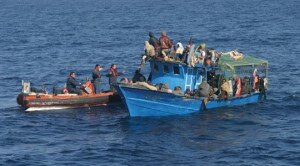
A day after Italian TV presenter Massimo Giletti claimed that Malta is known to shoot at migrants as they arrive on the island, claims which were later denied by the government, two overcrowded and rundown boats arrived in Malta yesterday evening, bringing with them around 500 Somali migrants; the first migrants to arrive in Malta since the start of the Libyan uprising just over a month ago.
The Armed Forces of Malta (AFM) said in a statement that at 2pm, French maritime rescue officials informed the AFM that one of their naval vessels, La Meuse, had encountered a 60-foot long boat to the east of Malta.
After hearing this news, the AFM sent its Air Wing helicopter to investigate the report and shortly afterwards, patrol vessel P-21 was sent to escort the migrants to Malta. AFM officials on board the P-21 reported that they were informed that around 200 migrants were onboard, half of whom were women and children.
They added that some migrants were not feeling well, since they had drank a lot of seawater.
The boat arrived in Malta and berthed at Haywharf, Sa Maison, just after 6pm.
Scores of AFM personnel and several members of the Malta Red Cross were on hand to assist the migrants.
Women and children got off the boat first, carrying with them a handful of possessions they had brought along.
One woman immediately felt unwell, and was soon lifted onto a stretcher and taken away in an ambulance. A male amputee in a wheelchair was also led away from the crowd.
At the same time, another boatload of migrants with around 300 migrants onboard arrived at Daħlet Qorrot in Gozo, and was escorted back to Malta by the AFM’s P-51. This boat also berthed at Haywharf, Sa Maison, just after 7.30pm.
The migrants were later taken to rest at the detention centres.
‘Malta’s migration system needs to be in line with European standards’
Prior to the migrants’ arrivals, Thomas Hammarberg, the Council of Europe Commissioner for Human Rights, commented during his visit to Malta that the island needs to move away from a reactive approach to migration and establish a system that is fully in line with European standards.
He added that Malta and Europe need each other if the challenges of migration are to be met in a manner that respects human rights. He explained that “a much more generous and collegial approach” is necessary on the part of other European states, by accepting to host some of the persons to whom Malta has rightly accorded international protection.
“… With the exception of France and Germany – and further afield the US – this has not been the case so far,” he stated.
Underlining that the current uncertainty related to the events in Libya and possible forced migration towards Malta and Europe, he said this should not deter the Maltese authorities from undertaking the necessary reforms.
“Instead this is another reason for more European solidarity to support these reforms,” said the Commissioner, while also noting that the substantial decrease in the number of irregular arrivals in Malta over the last two years has taken considerable pressure off Malta.
In total, 7,800 asylum applications were submitted in Malta in the five years between and including 2006 to 2010.
Material conditions in the open centres, which currently house some 2,300 migrants, are substandard and need to be improved “as a matter of urgency” said the Commissioner, highlighting this as a further area where Europe could help Malta make further progress. The Commissioner found that the Marsa open centre and, in particular, the tent village in Ħal Far offered inadequate conditions for both short or long periods of time.
Migrants putting a great deal of pressure on Malta’s resources – Ministry
The Justice and Home Affairs Ministry released a statement last night in reaction to Mr Hammarberg’s comments, stating that whereas a number of EU states, particularly France and Germany, and the USA have, in the past, assisted Malta by resettling some migrants, “it is a fact that, contrary to what is stated by Mr Hammarberg, Malta is still under considerable pressure by the migrants who arrived in Malta in previous years and the ones who will be landing in Malta in the coming days”.
The Ministry said it does not agree with Mr Hammarberg’s views with regard to its detention policy.
“The open centres, which currently host some 2,300 migrants, were never intended to provide long-term accommodation, but rather to offer shelter only until migrants could find suitable independent accommodation.
“Moreover, although it is recognised that material conditions at the open centres would, in certain cases, benefit from improvement, current conditions are a direct result of the fact that the centres have practically always been at full capacity and beyond, making refurbishment of certain facilities difficult, if not impossible,” the Ministry said
Source:independent

No comments:
Post a Comment